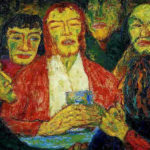We run our website the way we wished the whole internet worked: we provide high quality original content with no ads. We are funded solely by your direct support. Please consider supporting this project.

5 Differences Between The Kingdom of God and the Kingdom of the World
Image by matthijs rouw via Flickr
The kingdom of God looks and acts like Jesus Christ, like Calvary, like God’s eternal, triune love. It consists of people graciously embracing others and sacrificing themselves in service to others. It consists of people trusting and employing “power under” rather than “power over,” even when they, like Jesus, suffer because of this. It consists of people imitating the Savior who died for them and for all people. It consists of people submitting to God’s rule and doing his will. By definition, this is the domain in which is God is king.
Jesus’ kingdom is “not of this world,” for it contrasts with the kingdom of the world in every possible way. This is not a simple contrast between good and evil. The contrast is rather between two fundamentally different ways of doing life, two fundamentally different mindsets and belief systems, two fundamentally different loyalties. Here are five ways that it is different:
- A contrast of trusts: The kingdom of the world trusts the power of the sword, while the kingdom of God trusts the power of the cross. The kingdom of the world advances by exercising “power over,” while the kingdom of God advances by exercising “power under.”
- A contrast of aims: The kingdom of the world seeks to control behavior, while the kingdom of God seeks to transform lives from the inside out. Also, the kingdom of the world is rooted in preserving, if not advancing, one’s self-interests and one’s own will, while the kingdom of God is centered exclusively on carrying out God’s will, even if this requires sacrificing one’s own interests.
- A contrast of scopes: The kingdom of the world is intrinsically tribal in nature, and is heavily invested in defending, if not advancing, one’s own people-group, one’s nation, one’s ethnicity, one’s state, one’s religion, one’s ideologies, or one’s political agendas. That is why it is a kingdom characterized by perpetual conflict. The kingdom of God, however, is intrinsically universal, for it is centered on simply loving as God loves. It is centered on people living for the sole purpose of replicating the love of Jesus Christ to all people at all times in all places without condition.
- A contrast of responses: The kingdom of the world is intrinsically a tit-for-tat kingdom; its motto is “eye for an eye and a tooth for a tooth.” In this fallen world, no version of the kingdom of the world can survive for long by loving its enemies and blessing those who persecute it; it carries the sword, not the cross. But kingdom-of-God participants carry the cross, not the sword. We, thus, aren’t ever to return evil with evil, violence with violence. We are rather to manifest the unique kingdom of Christ by returning evil with good, turning the other cheek, going the second mile, loving, praying for our enemies. Far from seeking retaliation, we seek the well-being of our “enemy.”
- A contrast of battles: The kingdom of the world has earthly enemies and, thus, fights earthly battles; the kingdom of God, however, by definition has no earthly enemies, for its disciples are committed to loving “their enemies,” thereby treating them as friends, their “neighbors.” There is a warfare the kingdom of God is involved in, but it is “not against enemies of blood and flesh.” It is rather “against rulers, against the authorities, against the cosmic powers of this present darkness, against the spiritual forces of evil in the heavenly places” (Eph 6:12).
—Adapted from Myth of a Christian Nation, pages 46-48
Category: General
Tags: Cruciform Theology, Enemy Love, Jesus, Kingdom, Kingdom Living, Love, Myth of a Christian Nation, Upside-Down Kingdom, Warfare Worldview
Topics: Following Jesus
Related Reading

Which of the Miracles of Jesus Can Humans Do? (podcast)
Greg is asked about the miracles of Jesus, specifically which miracles do we have the potential to perform. He also gives a nod to the band Theocracy. Episode 74 http://traffic.libsyn.com/askgregboyd/Episode_0074.mp3

Hearing and Responding to God: Part 5
We hope you’ve enjoyed this series on hearing and responding to God. In this last video on the topic, Greg discusses the significance of the fact that God IS love, and how our communion with him is the product of God’s eternal loving nature. You can watch the earlier installments here, here, here, and here. ***Bonus: Greg experiences a…

Sermon: The Pygmy Way
Last weekend Greg preached about the history of Woodland Hills Church as a part of the church’s 20th anniversary. It’s a pretty fun walk down memory lane as well as a challenge to follow the “pygmy way” even when it looks silly. If you’d like to download the sermon you can find it here.

How Are We To Love the Soldiers of ISIS?
Over the last several weeks I’ve received some form of this question almost every day. In some cases the question is asked rhetorically, as though the very question exposes the absurdity of suggesting we are to love this terroristic group. Other times the question is asked with a pragmatic twist. One person recently said to…

The Cruciform Center Part 4: How Revelation Reveals a Cruciform God
I’ve been arguing that, while everything Jesus did and taught revealed God, the character of the God he reveals is most perfectly expressed by his loving sacrifice on the cross. Our theology and our reading of Scripture should therefore not merely be “Christocentric”: it should be “crucicentric.” My claim, which I will attempt to demonstrate…

Listen and Learn: A First Step Toward Reconciliation
Jesus Christ is not just the Lord, Savior and Messiah of the Jews: he is the Lord, Savior and Messiah of all people. Through Christ a kingdom is being established that tears down tribal walls between races and re-unites and reconciles people together in the love God. Paul makes the point most forcefully. In Ephesians…
